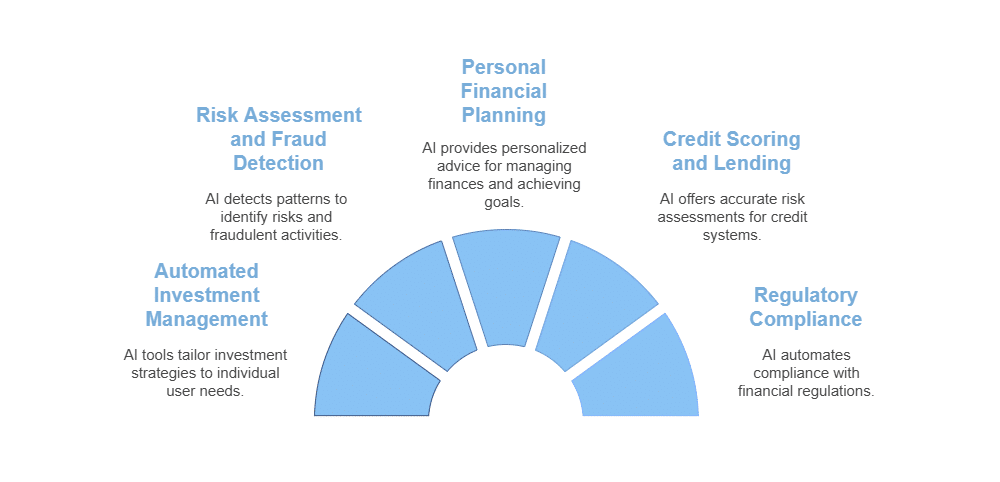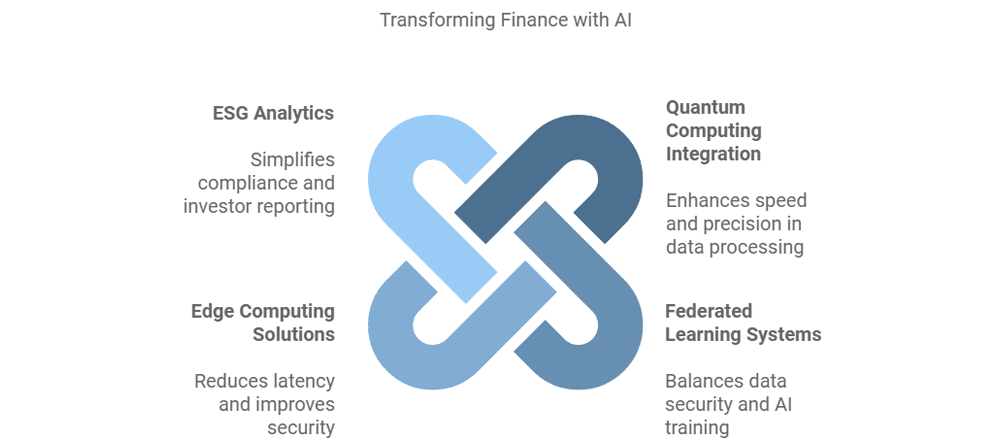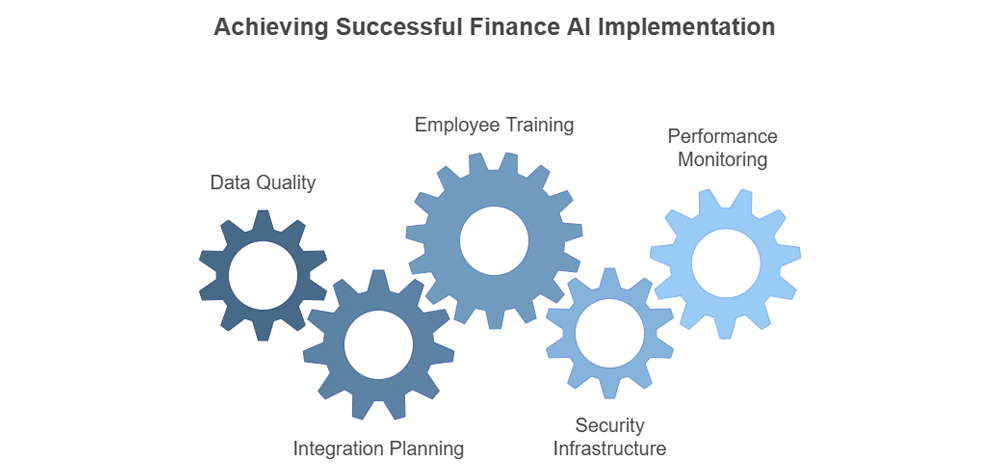Finance AI tools encompass all of the technologies that leverage machine learning within the finance industry. This typically allows for predictive techniques and powerful automation. AI is especially significant in the financial market due to how quickly economic trends can change. The lightning-fast speed of AI systems and their ability to operate around the clock makes them especially well suited to financial management. Likewise, AI can sift through mountains of economic data in an instant.
In this article, you’ll discover the best applications of AI within the financial industry.
Table of Contents:
- Understanding Finance AI Tools in Today’s Digital Era
- Why Finance AI Tools Are Transforming the Financial Landscape
- Five Key Applications of Finance AI Tools
- Four Emerging Trends Reshaping Finance AI Tools
- Five Critical Success Factors for Finance AI Tool Implementation
- Essential Features of Modern Finance AI Tools
- Best Practices for Implementing Finance AI Tools
- Top Finance AI Tools Revolutionizing Financial Management
- Booke AI: Intelligent Bookkeeping Automation
- Planful: Comprehensive Financial Planning Platform
- Trullion: AI-Powered Lease Accounting
- Vena Insights: Advanced Financial Analytics
- Nanonets: Intelligent Document Processing
- Stampli: AI-Powered Invoice Management
- Domo: Business Intelligence and Analytics
- DataRails: Financial Planning and Analysis
- Sage Intacct: Cloud Financial Management
- AlphaSense: Market Intelligence Platform
- Anaplan: Connected Planning Platform
- ChatGPT for Finance: Conversational AI Assistant
- Cube: Financial Planning Software
- Gradient AI: Insurance Analytics
- Kensho: Financial Analytics Platform
- Plaid: Financial Data Connectivity
- QuickBooks AI: Smart Accounting Software
- Xero: Cloud Accounting Platform
- Zest.ai: Credit Risk Assessment
- Zoho Finance: Integrated Financial Suite
- Finchat.io: AI Financial Assistant
- Medical AI Companies Revolutionizing Healthcare
- AI in Hospitals: Transforming Patient Care
Understanding Finance AI Tools in Today’s Digital Era
Finance AI tools typically focus on financial automation, predictive insights, data analysis, or a combination of those elements into a singular whole. In short, artificial intelligence tools in finance empower data-driven decision-making in a wide variety of economic specialties. Part of what makes artificial intelligence in finance so important in today’s market is its versatility.
These AI tools can be used to detect fraud, analyze potential financial risks, recommend solid investments, and generally work with anything related to financial data. This is made all the more important by the modern financial market, which offers so many ways to link up to software.
Why Finance AI Tools Are Transforming the Financial Landscape
The various finance AI tools are having such a huge impact due to overall compatibility. Finance is heavily focused on data and pattern matching. AI, in turn, excels in both of those areas. Finance-focused AI applications can sort through a massive amount of data in a fraction of the time it would take humans.
Once AI has taken in that data it can leverage the totality of its information to offer predictive, real-time, insights into the current market. The systems can work day and night to always stay updated on the current economic changes and trends.
Five Key Applications of Finance AI Tools
The most popular finance artificial intelligence tools can be separated into a few distinct key areas. The following are five of the key applications of finance AI tools.
Video: How AI is Revolutionizing Finance and Accounting
1. Automated Investment Management
Finance AI tools can act as personalized portfolio managers and advisors. These financial decision-making AI tools are especially notable in their ability to tailor investment strategy to the individual user. Everyone’s best strategy for wealth building will be unique to their own circumstances. And these AI tools can take those variables into account when determining investment strategies. They’ll weigh personal risk tolerance, goals, and real-time analysis of the market.
2. Risk Assessment and Fraud Detection
AI-enhanced financial tools base much of their functionality on pattern matching. This makes them especially valuable for noticing patterns associated with extreme risk and fraud. The artificial intelligence tools in finance also stay updated on the latest data patterns and compare them to past examples of extreme risk. As a whole, this means that AI can alert you to fraudulent deals.
3. Personal Financial Planning
Finance AI tools can monitor most aspects of your personal finances. This lets the AI deliver individualized advice on financial management, savings, budgeting, and more. Personal AI tools for financial management can even provide real-time budgeting based on your recent spending habits. Personalization is especially useful when you have a specific financial goal you’re working toward. AI can help implement strategies for success.
4. Credit Scoring and Lending
Risk assessment is a complex but vital part of most credit systems. Finance AI tools can quickly and efficiently search through an applicant’s data while also looking at additional sources to determine an accurate risk assessment. This provides a broader and more accurate view of someone’s risk than is provided by traditional credit scores. The process also provides firmer adherence to regulatory requirements.
5. Regulatory Compliance
Regulatory compliance is a complex but vitally important issue for anyone working in finance. However, finance AI tools can fully automate this process by continually analyzing data and reporting on any potential violations. The AI will also stay updated on the latest changes to regulations to ensure that you’re not caught unaware by them. The systems also ensure that everything is properly documented and organized
 .
.
Four Emerging Trends Reshaping Finance AI Tools
Finance AI tools are proving revolutionary within the industry’s landscape, but this is only the beginning. The following emerging trends are poised to provide even more benefits.
1. Quantum Computing Integration
Quantum computing represents a rethinking of processor design. The end result is a system that can operate at far greater speeds, with better precision, than traditional processors. Quantum computing is also able to easily process huge amounts of data at blindingly fast speeds. These traits make it an obvious match for finance artificial intelligence tools. Quantum computing can efficiently scale to the larger scale of the financial sector.
2. Federated Learning Systems
Data and security are two cornerstones of finance artificial intelligence tools. Federated learning systems provide a new way of balancing both by training on decentralized data. It’s a collaborative approach to AI training that leverages the special traits found in the larger financial sector’s community. It’s especially notable for protecting customer information while still allowing for a wide scope of training data.
3. Edge Computing Solutions
Speed and latency are among the most important elements of finance AI tools. Every second counts when you’re working in the financial sector. Edge computing allows for faster processing and lower latency times. However, it’s also a technique that stresses security and processes information near the point of origin. In doing so the AI improves speed, security, and even bandwidth.
4. Environmental, Social, and Governance (ESG) Analytics
ESG is an important metric, but it’s often difficult to manually adjust for compliance. Likewise, it’s difficult to map out your financial data into objective ESG metrics to show investors. Finance AI tools can work with your financial data to turn it into a concise and understandable overview of your ESG. The resulting analytics are useful for both devising ways to improve and sharing your work with others.

Five Critical Success Factors for Finance AI Tool Implementation
While finance artificial intelligence tools are powerful, they still need to be strategically leveraged. The following points highlight the most important factors for success with finance AI tools.
Video: Putting AI to work for Finance
1. Data Quality and Management
The accuracy of an AI is heavily tied to the quality of data it uses and is trained on. You must regularly audit the data used with finance AI tools to ensure its quality. The data needs to be clean, accurate, and properly parsed by your AI.
2. Strategic Integration Planning
AI-powered financial solutions represent a massive improvement over existing systems. However, this also means that you’ll need to plan for a multitude of different concerns such as compatibility with existing systems. AI implementation needs to include compatibility assessments which act as metrics for a carefully planned roadmap. By planning ahead you can ensure that the transition goes smoothly.
3. Employee Training and Change Management
Preparing employees for finance AI tools is just as important as preparing your computational resources. You’ll need to plan training programs to ensure employees know how to get the most out of the new AI. Likewise, you’ll need to plan for continuing training as new updates push enhanced features into the AI.
4. Security and Compliance Infrastructure
Any work with financial data requires a high level of security and finance artificial intelligence tools are no exception. Implementing machine learning tools for finance requires a strong security infrastructure. It’s equally important to make sure that your systems are in line with industry standards and regulations.
5. Performance Monitoring and Optimization
Just as employees need performance reviews, so do AI. You should implement regular performance monitoring to evaluate your finance AI tools. This helps to ensure that the AI is adapting to your ever-changing needs.

Essential Features of Modern Finance AI Tools
The features found in finance AI tools vary on a case-by-case basis. However, there are some important features found in the majority of finance artificial intelligence tools.
- Automate your data processing: AI can work through data in real-time as it changes to provide analysis and prediction of market trends.
- Forecast using predictive analytics: AI can predict movement within the market to identify risks and opportunities by extrapolating from historical data.
- Process data with natural language processing: Processing financial news, reports, and documents to determine sentiment and meaning.
- Improve visualization with customizable dashboards: Visualization tools can turn advanced AI output into visually appealing presentations with personalized performance indicators.
- Security protocols ensure consistent protection: Both encryption and authentication ensure your financial transactions and data remain secure.
- API integration allows for seamless expansion: API implementations let you hook AI into a variety of third-party applications or services.
Best Practices for Implementing Finance AI Tools
While finance AI tools are powerful, they’re not a universal panacea. How you use a tool is just as important as the tool’s quality. You should always consider the following best practices when working with finance artificial intelligence tools.
- Provide comprehensive training: Employees need training to fully leverage an AI’s benefits.
- Keep the AI updated: Most AI systems will have both security and performance center updates to ensure they remain competitive.
- Validate your data’s quality: The better the source data used by AI the better it performs. Make sure that you’re using high-quality data with your AI
- Continually monitor the AI’s performance: Schedule regular reviews of your AI’s performance using specific, objective, metrics.
- Regularly verify compliance: Continually document the AI’s decision-making process so that you can provide records as needed for audits and regulatory compliance.
- Create and maintain backup systems: Maintaining a secondary backup system will ensure continual performance even in cases of system failure or scheduled downtime.
Top Finance AI Tools Revolutionizing Financial Management
Finance AI tools are appearing and growing at a rapid pace. But the following are the best of the best, the tools defining the industry as a whole.
Booke AI: Intelligent Bookkeeping Automation
Booke AI provides a new and more accurate approach to bookkeeping. The system works through a process of reconciliation and automated data entry to perfectly categorize transactions. Additionally, it uses machine learning to search for patterns within that data and learns from the user’s corrections. The system’s dashboard provides real-time information and reports while allowing for easy integration with banking systems.
Video: Booke AI
Planful: Comprehensive Financial Planning Platform
Planful provides finance AI tools to create financial models using automated calculations and forecasting. The system addresses the industry’s need for strategic planning tools that use data-oriented methodology. Planful makes it easy to sort through all of its metrics within a unified collection of analytics and workflows. Additionally, it provides rolling forecasts that take new data into account as the financial landscape changes over time.
Video: Planful
Trullion: AI-Powered Lease Accounting
Trullion is one of the best finance artificial intelligence tools for automated lease accounting. The system simplifies this normally complex process by allowing users to directly feed documents into it. The AI classifies the information, processes scheduling, ensures compliance, and even integrates with standard accounting systems.
Video: Trullion
Vena Insights: Advanced Financial Analytics
Vena Insights combines predictive analytics with automated data collection to create a powerful set of finance AI tools. The platform can analyze financial data through predictive analytics to develop new insights. Vena Insights can deliver these results through easy-to-understand reporting templates. Additionally, you can chart potential plans through its scenario analysis tools. The system also features full integration with Excel.
Video: Vena Insights
Nanonets: Intelligent Document Processing
Nanonets leverages advanced AI to extract and classify data from financial documents. It also uses machine learning to improve efficiency with each iteration. The system can even use OCR to process scanned paperwork. Once Nanonets has processed a document it can take that information and create automated workflows or leverage its integrations with other financial systems.
Video: Nanonets
Stampli: AI-Powered Invoice Management
Stampli uses AI to enhance accounts payable processes. The finance AI tools leverage automation for invoice management and workflows to handle payment approval and execution. The invoice processing provides data extraction, handles duplicates, and approves routing. Finally, it integrates with most of the major platforms used for accounting while keeping detailed audit trails.
Video: Stampli
Domo: Business Intelligence and Analytics
Domo provides users with advanced data processing and visual analytics for business intelligence solutions. The visualization comes through personalized dashboards and can display predictive models, various reports, and collaborative elements. The package’s finance AI tools can also unify separate data sources into a unified whole.
Video: Domo
DataRails: Financial Planning and Analysis
DataRails enables you to use finance AI tools with familiar Excel-based systems. DataRails leverages the power of AI to analyze and consolidate data from various sources, make forecasts, and act as a bridge for collaboration. All of this comes through an Excel-style presentation which most people are already familiar with.
Video: DataRails
Sage Intacct: Cloud Financial Management
Sage Intacct uses cloud-based AI systems to streamline and automate accounting processes such as dimensional analytics, consolidation of multiple entities, and revenue recognition. Furthermore, the cloud-based infrastructure allows for an impressive level of scalability while providing wide accessibility.
Video: Sage Intacct
AlphaSense: Market Intelligence Platform
AlphaSense leverages competitive intelligence to provide strategic insights based on a combination of market data and your own choices of financial documentation. The platform’s finance artificial intelligence tools will analyze market data to find opportunities based on relevant trends. It’s able to essentially scan data in a humanlike way by using sentiment analysis for emotional meaning. AlphaSense can then provide you with automated alerts. Combined, this provides the user with invaluable help for strategic decision-making.
Video: AlphaSense
Anaplan: Connected Planning Platform
Anaplan is a platform whose finance AI tools bring together financial and operational planning. The system puts a priority on staying agile in order to respond to the continually changing market. This dynamic nature can be further seen in its modeling. Anaplan leverages predictive analytics within a collaborative environment. While the system has a wide reach for data and collaborative input, it ensures that everything is properly unified in a consistent and easy-to-leverage style.
Video: Anaplan
ChatGPT for Finance: Conversational AI Assistant
ChatGPT is primarily focused on natural language processing. As such, it assists in data analysis and reporting in a more conversational manner than many of the other finance AI tools. It’s an especially important option for those looking for a simplified yet still powerful approach to financial operations. The user-friendly presentation provides options for trend analysis, financial modeling, and report generation in a number of different formats.
Video: How to Use ChatGPT as a Financial Analyst
Cube: Financial Planning Software
Cube is an AI-powered tool that can assist you with both financial analysis and planning. It features finance artificial intelligence tools that can plan scenarios and provide updated forecasts to enable a new kind of planning process. The planning tools are advanced, but maintain a high level of user-friendliness through Excel compatibility.
Video: Cube
Gradient AI: Insurance Analytics
Gradient AI uses predictive modeling to work through vast amounts of insurance data and provide advanced analytics. It excels at underwriting and claims processes with the added benefit of ensuring compliance with insurance regulations. These capabilities are driven by automated tools dealing with fraud detection, underwriting, risk scoring, and optimization of claims.
Video: Gradient AI
Kensho: Financial Analytics Platform
Kensho is a platform to help you leverage actionable insights based on patterns it detects within market data. The platform’s finance AI tools support even the largest financial datasets. Advanced natural language processing ensures highly efficient data extraction and report generation. It can take even the most advanced data and present it as actionable reports.
Video: Kensho
Plaid: Financial Data Connectivity
Plaid provides a connectivity platform to link your applications to existing banking systems. Proper connectivity is a key requirement for finance AI tools in general but it’s often a complex process. Plaid simplifies these connections while still ensuring strong security, account verification, risk management, and identity protection.
Video: Plaid
QuickBooks AI: Smart Accounting Software
QuickBooks provides finance artificial intelligence tools that can automate your bookkeeping. In the process, QuickBooks will also categorize items and transactions, process receipts or invoices, and provide financial reports. The system provides users with powerful financial tools in a user-friendly graphical interface.
Video: QuickBooks AI
Xero: Cloud Accounting Platform
Xero provides scalable, cloud-based, finance AI tools for accounting. It emphasizes automating routine accounting procedures while ensuring everything remains easily accessible through group-enabled financial reports. Xero’s cloud-based nature ensures that it will easily scale to the task while retaining a high level of agility. The system also provides reconciliation with banks, expense tracking, and invoice management.
Video: Xero
Zest.ai: Credit Risk Assessment
Zest.ai provides users with tools to automatically analyze credit risk and lending decisions. The finance artificial intelligence tools use powerful machine learning to outpace traditional credit scoring methods which often exclude borrowers who should qualify. The automation includes risk modeling, underwriting, and compliance monitoring. Zest.ai can also provide a decision explanation to show why specific choices were made.
Video: Zest.ai
Zoho Finance: Integrated Financial Suite
Zoho Finance provides a full suite of automated finance AI tools. The suite covers a wide variety of functions related to financial management. Some of these include processing invoices, creating financial reports, invoice processing, expense management, and bookkeeping. It’s especially notable for the high level of integration found between the different functions.
Video: Zoho Finance
Finchat.io: AI Financial Assistant
Finchat.io uses natural language interactions to provide user-friendly functionality. The system’s finance AI tools include data visualization, personalized financial analysis, and automated reporting. The system can provide all that and more in an interface that mimics speaking to a human expert. However, Finchat.io has all the power of AI and ensures both a high level of security and standards compliance.
Video: Finchat.io
Medical AI Companies Revolutionizing Healthcare
AI-based tools for finance are just one example of how AI is changing various industries. The medical industry, in particular, has benefitted tremendously from AI. This is in part due to its own use of finance AI tools. However, there are a variety of healthcare-focused tools. For example, just as financial AI can use analytics to predict possible problems, medical AI can also calculate probable medical issues with patients.
You can learn about medical AI companies and innovative uses for the technologies in the article “Medical Artificial Intelligence Companies Leading Healthcare’s Digital Revolution“.
AI in Hospitals: Transforming Patient Care
Many hospitals feature larger-scale AI integrations. Just as finance AI tools provide specialized functionality, so too can healthcare-centered AI. These AI hospitals leverage different forms of AI to benefit every section of their service. For example, AI can search for contraindications within patients’ medications or treatment plans. Or doctors might use AI to go over diagnostics through medical databases.
You can learn more about the larger-scale use of AI in hospitals and how it improves the patient experience in the article “Hospitals Using Artificial Intelligence: Revolutionizing Healthcare with Advanced Technology“.
Did You Like This Article about Finance AI Tools?
You might also be interested in the following articles:
- Artificial Intelligence Quiz; Challenge Yourself with the Ultimate AI Quiz!
- AI Marketing; Take Advantage of Artificial Intelligence Strategies
- Benefits of Augmented Reality for Businesses; The Main Advantages
Finance AI tools can be a complex subject. However, you now have everything you need to get started. The final step is to consider what you now know and to take action.









Leave A Comment